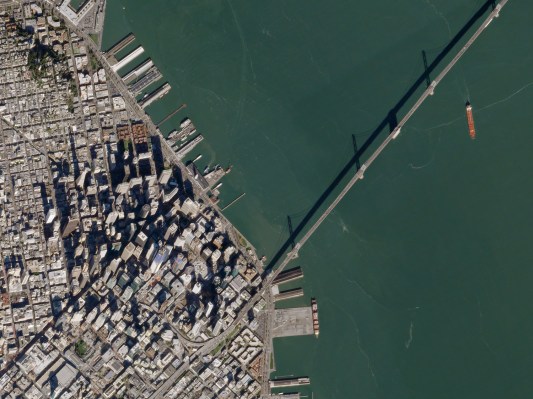Google will sell its Terra Bella business, which includes a group of SkySat Earth imaging satellites, to Planet Labs, the companies confirmed on Friday after TechCrunch’s Ingrid Lunden first reported that a deal was going down on January 25. Google’s space-high view of the world in its mapping software isn’t going anywhere, however – Google will continue to license Earth imaging for its use from Planet in a multi-year contract that’s part of the sale arrangement.
In a blog post announcing the news, Planet Labs’ Will Marshall notes that the seven high-res SkySat satellites it’s acquiring as part of the deal will be “highly complimentary” to its existing fleet of medium res satellites, which includes 60 units in total. Planet’s existing network can only get three to five meter resolution, while Google’s satellites can manage “sub-meter,” which is why images on Google Earth and Google Maps tend to be so crisp and clear, like the one you see above.
Planet will use the Terra Bella capabilities to help grow its potential customer base: The company has a brisk commercial business, it says, through its existing medium resolution capabilities, but the higher-res imaging it’ll get now will allow it to appeal to more consumer endpoints and broach new markets, including for clients like Google itself.
Terra Bella was itself an acquisition for Google, picked up as Skybox Imaging in 2014 in a deal valued at $500 million. Google has recently been realigning its business, beginning with the formation of Alphabet as an overarching parent company, and it’s likely that owning its own satellite imaging rather than licensing it from a dedicated provider is part of that ongoing rationalization of its various lines of business.
The financial terms of the deal were not disclosed, though in TechCrunch’s original reporting a potential price for Climate Corporation, another prospective buyer, was said to be set at $300 million.
Earlier on Friday, Planet announced a plan to launch an additional 88 so-called cubists, which are small, lower cost satellites. This will be the largest single launch of satellites at one time in history, and is currently scheduled for February 14.
